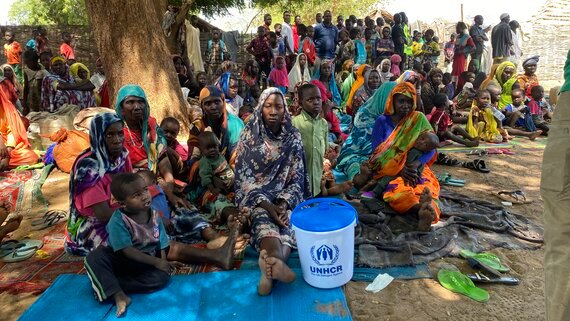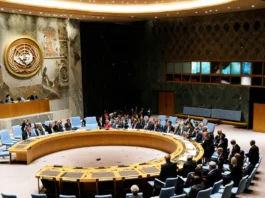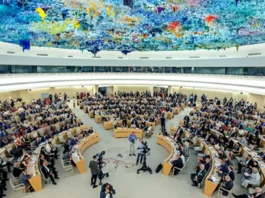Overview of the Presidential Statement
The recent presidential statement adopted by the United Nations Security Council represents a significant step toward addressing the multifaceted challenges faced by the Central African region. Document S/PRST/2024/7 has emerged as a pivotal tool for articulating the international community’s stance on pressing security matters within this area, reflecting both the urgency of the situation and the collective efforts to foster stability. The United Kingdom, as the introducer of this statement, has played a crucial role in orchestrating the discussions that culminated in this announcement, further highlighting its commitment to the peace and security of Central Africa.
This presidential statement is driven by a myriad of concerns that have escalated in recent years, including rampant violence, political instability, and humanitarian crises affecting millions. The involvement of various armed groups, coupled with resource-related conflicts, has exacerbated the situation and created a complex web of challenges that necessitate nuanced international engagement. The Security Council’s decision to adopt S/PRST/2024/7 illustrates a formal recognition of these challenges and is indicative of an intention to mobilize resources and attention towards resolving them.
Additionally, this document serves not only as an immediate response to ongoing crises but also as a long-term framework for addressing the underlying issues that fuel conflict in the region. Historical grievances, social fragmentation, and economic disparities contribute to a volatile landscape that has evaded swift resolutions. The statement itself emphasizes a collaborative approach, urging all stakeholders to unify efforts aimed at restoring peace and enhancing security in Central Africa. By fostering dialogue and supporting local governance initiatives, the Security Council aims to lay the groundwork for sustainable peace, reflecting the gravity of the situation and the shared responsibility of the international community in this endeavor.
Threats and Challenges Highlighted by the Security Council
The Central African region has been plagued by a multitude of threats and challenges that have drawn the attention of the Security Council, as articulated in its recent presidential statement. One of the primary concerns is the prevalence of armed conflicts which have destabilized the region, often leading to significant loss of life and the displacement of populations. These conflicts are frequently fueled by political instability and ethnic tensions, creating a complex web of violence that is difficult to untangle.
Additionally, the emergence of terrorism and violent extremism poses a serious risk to both local and international communities. Groups operating in the region have demonstrated a capacity for brutality, often targeting civilians and humanitarian workers. These acts of violence not only exacerbate the humanitarian crisis but also serve to undermine the rule of law and international humanitarian standards. Civilians and aid workers in particular are vulnerable, facing threats ranging from kidnappings to outright attacks, which severely limits their ability to deliver essential services and aid.
Furthermore, transnational organized crime has become increasingly prevalent, compounding the already dire security situation. Criminal activities such as drug trafficking, arms smuggling, and human trafficking are often intertwined with armed groups, making it challenging for authorities to establish control and maintain safety. These threats are not isolated to their immediate geographic boundaries, as they often have far-reaching implications for regional stability and international security.
In light of these issues, it is crucial for the international community to engage actively, ensuring that necessary support is provided to mitigate these challenges. Addressing such multifaceted threats requires a comprehensive strategy, recognizing that both immediate and long-term solutions are necessary to restore security and uphold the principles of international humanitarian law in the Central African region.
Humanitarian Consequences and Regional Stability
The Central African region has been significantly affected by ongoing violence and instability, leading to dire humanitarian consequences that pose serious challenges to regional stability. The protracted conflicts have exacerbated food insecurity, leaving millions of individuals vulnerable and in dire need of assistance. According to recent reports, an estimated 2.5 million people in the Central African Republic face acute food shortages, largely due to disruptions in agricultural activities and market access caused by violence. As a result, malnutrition rates have soared, particularly among children and other vulnerable groups.
In addition to food insecurity, the region is grappling with health emergencies that stem from the breakdown of healthcare services. Instability has created a situation where communicable diseases, such as malaria and cholera, flourish. Accessing health care has become increasingly difficult for communities, as conflict zones hinder the delivery of essential services and the movement of humanitarian personnel. Consequently, the public health infrastructure is at risk of collapse, further straining the lives of those already affected by violence.
The displacement of individuals, including both refugees and internally displaced persons (IDPs), has surged due to the ongoing conflicts. It is estimated that over 1 million individuals have been forcibly displaced within the Central African Republic, while many others seek refuge in neighboring countries, leading to significant cross-border challenges. These movements have strained host communities, creating tension and resource shortages that can destabilize the region further. The spillover effects of these displacements are evident in neighboring countries such as Sudan, where an influx of refugees complicates existing humanitarian needs and poses additional burdens on local infrastructures.
The compounded effects of food insecurity, health emergencies, and displacement illustrate the pressing humanitarian crisis in the Central African region. Addressing these issues is crucial not only for the affected populations but also for the overall stability of the region, highlighting the interconnected nature of humanitarian needs and regional security.
Looking Ahead: Governance and Support for Democratic Elections
The recent presidential statement adopted by the Security Council underscores the critical need for governance improvements and support for democratic elections in the Central African region. As the region anticipates upcoming elections, the emphasis on inclusive and fair electoral processes becomes pivotal. The Security Council’s appeal highlights the essential role of national stakeholders in fostering collaboration, which is necessary for establishing a robust democratic framework.
Yet, the journey toward credible elections is complicated by ongoing governance issues and the potential for constitutional changes. These factors often influence election integrity, casting doubts about the commitment of various actors to uphold democratic values. In this light, stakeholders must prioritize transparency and accountability, ensuring that every voice is represented and that the electoral process remains untainted by corruption and power struggles.
The Security Council’s encouragement for regional offices to bolster governance initiatives indicates a proactive approach that could help mitigate some of these challenges. By enhancing institutional frameworks and providing technical assistance, these offices can empower states to navigate the complexities of governance and electoral dynamics more effectively. The collaboration among civil society, government institutions, and international organizations is essential to create an environment conducive to democratic practices.
Furthermore, it is vital for international partners to monitor the evolving situation within Central Africa actively. They can facilitate dialogues among various stakeholders and lend support in ensuring that the elections are not only participatory but also reflect the will of the people. This cooperative framework will serve as a foundation for stability and growth in a region that has historically faced significant political strife.
In conclusion, collective efforts toward governance reform and democratic elections are imperative for the Central African region. By embracing collaboration and adhering to democratic principles, stakeholders can pave the way for a future characterized by stability, inclusivity, and respect for human rights.




